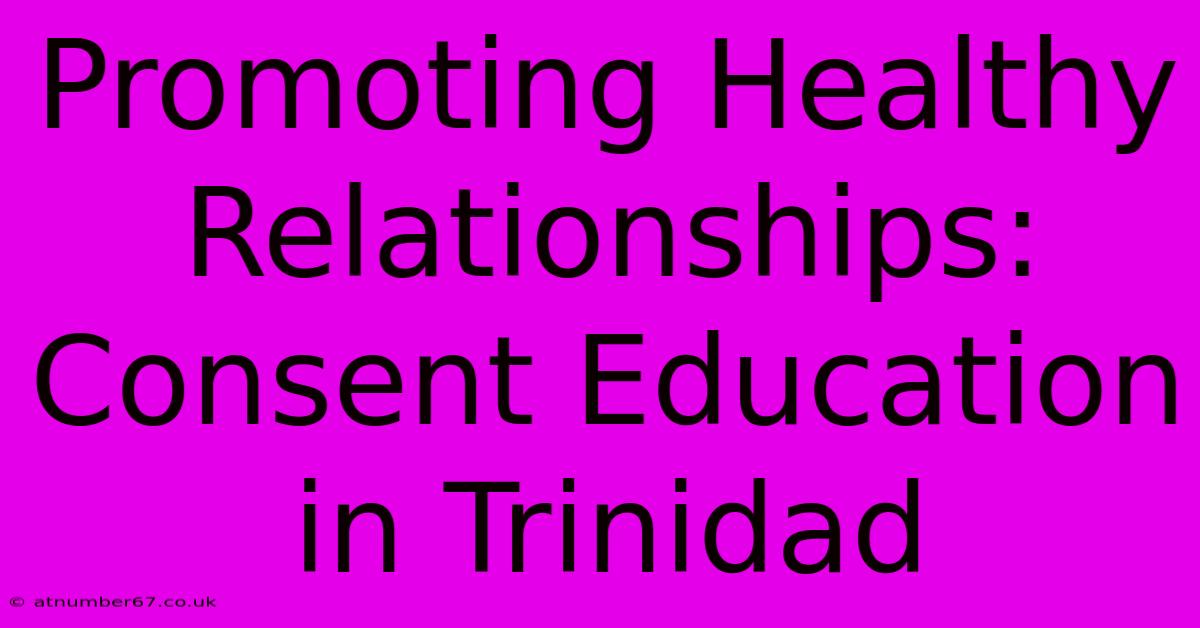Promoting Healthy Relationships: Consent Education In Trinidad

Table of Contents
Promoting Healthy Relationships: Consent Education in Trinidad and Tobago
Trinidad and Tobago, like many nations, faces challenges in fostering healthy relationships. A crucial element in addressing these challenges is comprehensive consent education. This article explores the importance of consent education in Trinidad and Tobago, its current state, and strategies for improvement.
Understanding Consent in the Context of Trinidad and Tobago
Consent, simply put, means enthusiastic agreement. It's not just the absence of "no," but a clear and affirmative "yes." This is particularly crucial in discussions surrounding sexual health and relationships. However, cultural norms and traditional beliefs in Trinidad and Tobago sometimes complicate open conversations about consent. These might include:
- Power imbalances: Age, social status, and family dynamics can influence the dynamics of relationships and impact the ability to freely give or refuse consent.
- Misconceptions about consent: The belief that silence or passive behavior equates to consent is a dangerous misconception that needs addressing.
- Limited open dialogue: Open communication about sex and relationships is still considered taboo in some segments of Trinbagonian society.
The Urgent Need for Consent Education
The consequences of a lack of consent education are far-reaching:
- Increased rates of sexual assault and harassment: Without a clear understanding of consent, individuals may unknowingly engage in harmful behaviors.
- Damaged relationships: A lack of respect for boundaries undermines trust and intimacy.
- Negative mental health outcomes: Experiencing or perpetrating sexual assault can have devastating long-term psychological effects.
- Societal impact: The normalization of non-consensual behavior creates an unsafe environment for everyone.
The Current State of Consent Education in Trinidad and Tobago
While some efforts are underway, comprehensive consent education remains insufficient. Schools often touch upon the topic within the broader context of sexual health education, but it often lacks the depth and specificity needed. Furthermore, consistent and accessible resources for adults are scarce. The lack of culturally sensitive materials tailored to the specific nuances of Trinbagonian society further exacerbates this issue.
Strategies for Improving Consent Education in Trinidad and Tobago
Improving consent education requires a multi-pronged approach:
1. Comprehensive Curriculum Integration:
- Early childhood education: Introduce age-appropriate discussions about body autonomy and personal boundaries from a young age.
- Secondary school curriculum: Incorporate detailed, interactive lessons on consent, healthy relationships, and bystander intervention.
- Teacher training: Equip educators with the knowledge and skills to effectively deliver this sensitive information.
2. Community-Based Initiatives:
- Workshops and seminars: Organize community-based workshops for both young people and adults on consent, healthy relationships, and respectful communication.
- Public awareness campaigns: Utilize diverse media platforms to disseminate information about consent and challenge harmful societal norms.
- Collaboration with NGOs: Partner with local NGOs specializing in sexual health and gender-based violence to create and distribute educational materials.
3. Accessible Resources and Materials:
- Develop culturally relevant resources: Create educational materials that resonate with the diverse cultural and linguistic backgrounds in Trinidad and Tobago.
- Utilize online platforms: Leverage online resources and social media to reach a wider audience and provide accessible information.
- Multilingual materials: Ensure educational materials are available in multiple languages to reach a broader segment of the population.
Conclusion: Building a Culture of Consent in Trinidad and Tobago
Promoting healthy relationships through comprehensive consent education is a crucial investment in the well-being of individuals and the future of Trinidad and Tobago. By implementing these strategies, we can cultivate a culture of respect, understanding, and consent, creating safer and healthier communities for everyone. The responsibility lies with educators, community leaders, government agencies, and individuals to collaboratively champion this vital cause. The time for meaningful change is now.

Thank you for visiting our website wich cover about Promoting Healthy Relationships: Consent Education In Trinidad. We hope the information provided has been useful to you. Feel free to contact us if you have any questions or need further assistance. See you next time and dont miss to bookmark.
Featured Posts
-
Alina Rose Aging Gracefully
Apr 12, 2025
-
Age Of Disclosure A Powerful Documentary
Apr 12, 2025
-
Tot Mom Your Guide To Stress Management
Apr 12, 2025
-
Shahid Kapoors Age Staying Relevant In A Changing World
Apr 12, 2025
-
Sushma Swarajs Daughter A Story Of Strength And Grace
Apr 12, 2025
